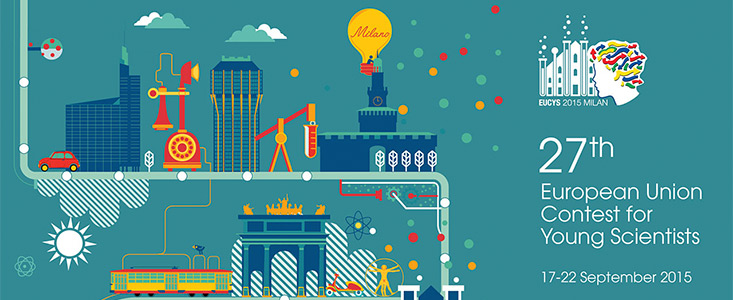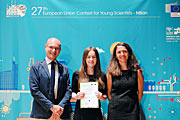Anuncio
Ganadores del Concurso de la Unión Europea para Jóvenes Científicos 2015
25 de Septiembre de 2015
Entre el 17 y el 21 de septiembre de 2015, más de 169 jóvenes científicos, de edades comprendidas entre los 14 y los 20 años, presentaron un total de 103 proyectos provenientes de 39 países ante un panel de jueces internacionales en la Fabbrica del Vapore en Milán, Italia. Esta fue la edición número 27 del Concurso de la Unión Europea para Jóvenes Científicos (EUCYS, por sus siglas en inglés), y este año fue la más grande de su historia en sus más de tres décadas de existencia. Los ganadores ya han sido anunciados.
Los tres primeros premios, de 7.000 euros cada uno, fueron otorgados a Sanath Kumar Devalapurkar de los EE.UU. por el trabajo “On the Stability and Algebraicity of Algebraic K-theory” (Sobre la Estabilidad y Algebricidad de la K-teoría Algebraica), Michał Bączyk y Paweł Piotr Czyż de Polonia por “The studies of behaviour of single and coupled on-off type oscillators on the example of bottle oscillators” (Estudios del comportamiento de los osciladores on-off acoplados e independientes basados en osciladores de botella) y Lukas Stockner de Alemania por “Statistical modeling of volume-scattered light” (Modelo estadístico de la dispersión por volumen de la luz). Los segundos lugares (5.000 euros) fueron otorgados a equipos de Austria, Rusia y Polonia, mientras que los terceros (3.500 euros) se concedieron a proyectos de Nueva Zelanda, Alemania y Estonia.
Como miembro del EIROforum, el grupo de las ocho principales Organizaciones Intergubernamentales Europeas de Investigación, ESO donó un premio especial para el mejor proyecto en el campo de la física espacial y astronómica. Paulina Drożak de Polonia fue la ganadora en esta categoría. Ella recibirá un viaje a los sitios de ESO en Chile, incluyendo visitas al Observatorio Paranal y a las instalaciones de ESO en Santiago por su proyecto acerca de la relación entre las anomalías de temperatura en la Tierra y en la actividad solar. Este viaje le ofrecerá una apreciación única de la vida en los observatorios astronómicos más avanzados del mundo, una experiencia de ensueño que podría inspirar a Paulina a dedicarse a la astronomía y astrofísica en el futuro.
Establecido en 1989, el EUCYS tiene como objetivo promover los ideales de cooperación e intercambio entre los científicos jóvenes y guiarlos hacia futuras carreras en el área de las ciencias y la tecnología. El panel contó con la participación de 22 jueces, dos de los cuales forman parte de los institutos que conforman el EIROforum.
Enlaces
Contactos
Richard Hook
Encargado de Prensa de ESO
Garching bei München, Alemania
Tel: +49 89 3200 6655
Cel: +49 151 1537 3591
Correo electrónico: rhook@eso.org
Sobre el anuncio
| Identificador: | ann15072 |
Our use of Cookies
We use cookies that are essential for accessing our websites and using our services. We also use cookies to analyse, measure and improve our websites’ performance, to enable content sharing via social media and to display media content hosted on third-party platforms.
ESO Cookies Policy
The European Organisation for Astronomical Research in the Southern Hemisphere (ESO) is the pre-eminent intergovernmental science and technology organisation in astronomy. It carries out an ambitious programme focused on the design, construction and operation of powerful ground-based observing facilities for astronomy.
This Cookies Policy is intended to provide clarity by outlining the cookies used on the ESO public websites, their functions, the options you have for controlling them, and the ways you can contact us for additional details.
What are cookies?
Cookies are small pieces of data stored on your device by websites you visit. They serve various purposes, such as remembering login credentials and preferences and enhance your browsing experience.
Categories of cookies we use
Essential cookies (always active): These cookies are strictly necessary for the proper functioning of our website. Without these cookies, the website cannot operate correctly, and certain services, such as logging in or accessing secure areas, may not be available; because they are essential for the website’s operation, they cannot be disabled.
Functional Cookies: These cookies enhance your browsing experience by enabling additional features and personalization, such as remembering your preferences and settings. While not strictly necessary for the website to function, they improve usability and convenience; these cookies are only placed if you provide your consent.
Analytics cookies: These cookies collect information about how visitors interact with our website, such as which pages are visited most often and how users navigate the site. This data helps us improve website performance, optimize content, and enhance the user experience; these cookies are only placed if you provide your consent. We use the following analytics cookies.
Matomo Cookies:
This website uses Matomo (formerly Piwik), an open source software which enables the statistical analysis of website visits. Matomo uses cookies (text files) which are saved on your computer and which allow us to analyze how you use our website. The website user information generated by the cookies will only be saved on the servers of our IT Department. We use this information to analyze www.eso.org visits and to prepare reports on website activities. These data will not be disclosed to third parties.
On behalf of ESO, Matomo will use this information for the purpose of evaluating your use of the website, compiling reports on website activity and providing other services relating to website activity and internet usage.
Matomo cookies settings:
Additional Third-party cookies on ESO websites: some of our pages display content from external providers, e.g. YouTube.
Such third-party services are outside of ESO control and may, at any time, change their terms of service, use of cookies, etc.
YouTube: Some videos on the ESO website are embedded from ESO’s official YouTube channel. We have enabled YouTube’s privacy-enhanced mode, meaning that no cookies are set unless the user actively clicks on the video to play it. Additionally, in this mode, YouTube does not store any personally identifiable cookie data for embedded video playbacks. For more details, please refer to YouTube’s embedding videos information page.
Cookies can also be classified based on the following elements.
Regarding the domain, there are:
- First-party cookies, set by the website you are currently visiting. They are stored by the same domain that you are browsing and are used to enhance your experience on that site;
- Third-party cookies, set by a domain other than the one you are currently visiting.
As for their duration, cookies can be:
- Browser-session cookies, which are deleted when the user closes the browser;
- Stored cookies, which stay on the user's device for a predetermined period of time.
How to manage cookies
Cookie settings: You can modify your cookie choices for the ESO webpages at any time by clicking on the link Cookie settings at the bottom of any page.
In your browser: If you wish to delete cookies or instruct your browser to delete or block cookies by default, please visit the help pages of your browser:
Please be aware that if you delete or decline cookies, certain functionalities of our website may be not be available and your browsing experience may be affected.
You can set most browsers to prevent any cookies being placed on your device, but you may then have to manually adjust some preferences every time you visit a site/page. And some services and functionalities may not work properly at all (e.g. profile logging-in, shop check out).
Updates to the ESO Cookies Policy
The ESO Cookies Policy may be subject to future updates, which will be made available on this page.
Additional information
For any queries related to cookies, please contact: pdprATesoDOTorg.
As ESO public webpages are managed by our Department of Communication, your questions will be dealt with the support of the said Department.


